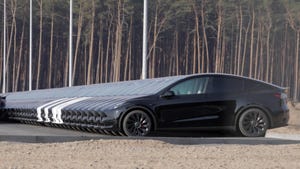
The Total Cost of Owning an Electric Car Is Its Secret Weapon - CNET
The Total Cost of Owning an Electric Car Is Its Secret Weapon
Advantages beyond sticker price and fuel savings complete the story that will tip EVs into ubiquity.
If you’re waiting for longer range, faster charging and lower sticker prices before buying an EV, you might already be missing the boat: An electric car’s total cost of ownership is challenging that of combustion engine cars and may soon make an EV the only logical car to buy.
TCO isn’t a concept unique to EVs: It applies to anything you buy that has long-term durability and costs along the way. Whether electric or gas, the TCO of a car is based primarily on these factors:
- Price paid for the car, including manufacturer rebates.
- Financing costs to buy or lease.
- Depreciation of the car over time.
- Registration and licensing fees.
- Government tax incentives or credits.
- Insurance premiums.
- Maintenance costs.
- Repair bills.
- Fuel or energy costs.
Most car buyers think of the first and last items above and tend to ignore the ones in the middle. But rolling them up, Boston Consulting Group believes the TCO of plug-in cars will be a big motivator of their sales as soon as 2023, pushing pure combustion cars to less than half of global new car sales by 2030. TCO is how EVs move beyond the realm of urban elites, early adopters, Tesla acolytes and tree huggers.

There’s a long history of technologies taking off once consumers perceive them to be affordable and good enough, not perfect. The EV seems to be on the threshold of that moment, especially if more consumers adopt a realistic take on the range they need in an electric car.
None of this means EVs are cheaper in every way. They tend to be more expensive in terms of sticker price, insurance premiums and repair costs for reasons that generally tie back to their newness and relative lack of scale.
But electric cars are famously less expensive in terms of energy cost and maintenance costs — they lack many of the systems that require maintenance on conventional cars — and through government financial incentives that can bring down their effective sale price, though the most popular electric cars from Tesla and GM no longer qualify for major federal tax credits due to their success in the market.
Consumer Reports recently compared popular plug-in cars to their conventional counterparts and estimated that owners of full battery and plug-in hybrid cars incur only half the repair and maintenance costs of a conventional car and that those driving pure electric cars enjoy 60% savings in energy costs.
Here’s a pro tip: Turbocharge an electric car’s TCO advantage by buying a used one. That zeroes out of the depreciation expense, a major factor in TCO, while minimally reducing the vehicle’s utility if you agree with my sober assessment of how much range you really need in an electric car.

